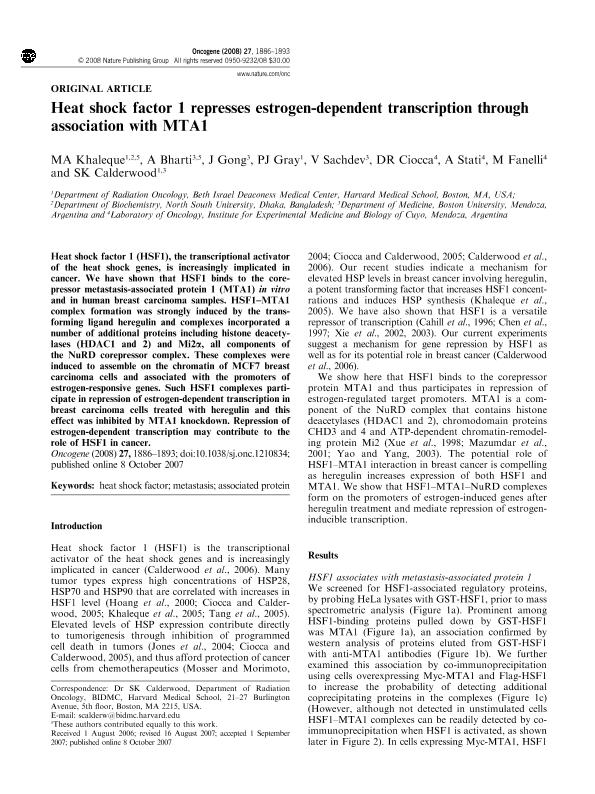Artículo
Heat shock factor 1 represses estrogen-dependent transcription through association with MTA1
Khaleque, M. A.; Bharti, A.; Gong, J.; Gray, P. J.; Sachdev, V.; Ciocca, Daniel Ramon ; Stati, Arturo Oscar
; Stati, Arturo Oscar ; Fanelli, Mariel Andrea
; Fanelli, Mariel Andrea ; Calderwood, S. K.
; Calderwood, S. K.
 ; Stati, Arturo Oscar
; Stati, Arturo Oscar ; Fanelli, Mariel Andrea
; Fanelli, Mariel Andrea ; Calderwood, S. K.
; Calderwood, S. K.
Fecha de publicación:
03/2008
Editorial:
Nature Publishing Group
Revista:
Oncogene
ISSN:
0950-9232
Idioma:
Inglés
Tipo de recurso:
Artículo publicado
Clasificación temática:
Resumen
Heat shock factor 1 (HSF1), the transcriptional activator of the heat shock genes, is increasingly implicated in cancer. We have shown that HSF1 binds to the corepressor metastasis-associated protein 1 (MTA1) in vitro and in human breast carcinoma samples. HSF1-MTA1 complex formation was strongly induced by the transforming ligand heregulin and complexes incorporated a number of additional proteins including histone deacetylases (HDAC1 and 2) and Mi2α, all components of the NuRD corepressor complex. These complexes were induced to assemble on the chromatin of MCF7 breast carcinoma cells and associated with the promoters of estrogen-responsive genes. Such HSF1 complexes participate in repression of estrogen-dependent transcription in breast carcinoma cells treated with heregulin and this effect was inhibited by MTA1 knockdown. Repression of estrogen-dependent transcription may contribute to the role of HSF1 in cancer.
Archivos asociados
Licencia
Identificadores
Colecciones
Articulos(IMBECU)
Articulos de INST. DE MEDICINA Y BIO. EXP. DE CUYO
Articulos de INST. DE MEDICINA Y BIO. EXP. DE CUYO
Citación
Khaleque, M. A.; Bharti, A.; Gong, J.; Gray, P. J.; Sachdev, V.; et al.; Heat shock factor 1 represses estrogen-dependent transcription through association with MTA1; Nature Publishing Group; Oncogene; 27; 13; 3-2008; 1886-1893
Compartir
Altmétricas



